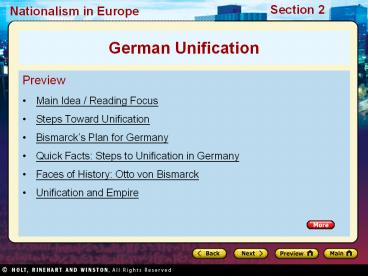Preview PowerPoint PPT Presentation
1 / 23
Title: Preview
1
German Unification
- Preview
- Main Idea / Reading Focus
- Steps Toward Unification
- Bismarcks Plan for Germany
- Quick Facts Steps to Unification in Germany
- Faces of History Otto von Bismarck
- Unification and Empire
2
German Unification
- Preview, continued
- Map The Unification of Germany
- The Empires Growth and Change
- Quick Facts Germanys Economic Growth
3
German Unification
Main Idea In the late 1800s, Otto von Bismarck
transformed Germany from a loose confederation of
separate states into a powerful empire.
- Reading Focus
- What steps did Germany take toward unification?
- What was Bismarcks plan for Germany and how did
he hope to achieve it? - How did wars lead to the unification of a German
Empire? - In what ways did Germany grow and change after
unification?
4
Steps Toward Unification
Germany was not a unified nation in 1848,
although the patchwork of independent states did
have a common language and culture.
5
- Unkept Promises
- Facing calls for increased democracy, Prussian
king Frederick Wilhelm IV promised constitution,
other reforms - End of 1848, went back on promises constitution
never written - Banned publications, organizations that supported
democracy
- Economic, Cultural Unity
- 1834, Zollverein, customs union, created removed
tariffs on products traded between German states - Inspired businesspeople to support unification
encouraged growth of railroads connecting German
states joined Germans economically - German economy growing sense of German culture
growing as well
6
Identify What was the outcome of the revolution
of 1848 in Prussia?
Answer(s) failed to bring democratic reform to
Prussia
7
Bismarcks Plan for Germany
- Otto von Bismarck, conservative politician,
leading force behind German unification - Became prominent in Prussian politics
- 1847, gave strongly conservative speech at
National Assembly - 1862, new Prussian king, Wilhelm I, chose
Bismarck as prime minister
8
(No Transcript)
9
Bismarcks First War
10
(No Transcript)
11
Describe What was the plan of Bismarck to unite
Germany?
Answer(s) increase the Prussian military, go to
war with Austria
12
Unification and Empire
Bismarck could not increase Prussias power as
long as Austria was in the way. But with two
short wars, Bismarck moved Austria out of the way
and established a unified German Empire.
13
France and Austria
14
The Franco-Prussian War
- Unified Germany
- Despite Austro-Prussian War victory, it would
take another war to create unified Germany - Southern German states still not included in
North German Confederation
- Nationalism in South
- 1870, conflict brewing with France over disputed
Alsace, Lorraine territory - Provinces had been part of Holy Roman Empire,
which included Prussia - Issue sparked nationalistic feelings in south
German states
- Peace Treaty
- Southern states supported Prussia, north German
states in war with France - 1871, Bismarck won Franco-Prussian War
- Peace treaty declared unification of Germany
15
(No Transcript)
16
Creating the German Empire
- Peace treaty had far-reaching consequences
- Victory established unified German empire
- Representatives of allied German states met at
Versailles, near Paris - Proclaimed Wilhelm I first kaiseremperorof
German Empire - Wilhelm appointed Bismarck first chancellor
- German victory changed balance of power in Europe
- Napoleon III gone France no longer as powerful
- As Germany grew economically, new empire rose in
power
17
Sequence How did the Austro-Prussian and the
Franco-Prussian wars lead to German unification?
Answer(s) The Austro-Prussian War joined
together the north German states. After Prussia
won the Franco-Prussian War, the peace treaty
declared the unification of Germany.
18
The Empires Growth and Change
In the years after 1871, Germany prospered. Under
the leadership of Wilhelm I and Bismarck, Germany
developed into a strong empire. This period was
known as the Second Reich, or empire, because
Germans considered the Holy Roman Empire to be
the First Reich.
This struggle between the government and the
church was known as Kulturkampf, which means the
struggle for culture.
19
Economic Growth
- Railroads
- After unification, Germany experienced time of
economic growth - France had paid reparationsmoney for war damages
- German leaders used some money to build railroads
to link German states
- Industrial Growth
- Other funds helped build German businesses
- New empire began to catch up with other
industrialized countries of Europe - Coal mines, steel factories flourished in
Germanys major cities
- Path to Social Reforms
- Industrialization had critics in Germany
- German socialists protested against harsh factory
conditions - Called for state control of all industries
20
Legislation
- Bismarck tried to destroy socialism
- Blamed socialists for two assassination attempts
on emperor - Sought to reduce appeal of socialism by enacting
own reforms - 1880s, pushed through legislation providing
benefits for - Health
- Accidents
- Old age
- Disability
21
Bismarck and Wilhelm II
- After Unification
- Bismarck did not want to expand Germanys borders
- Believed France remained a threat, however
- Alliances
- Bismarck made alliances with Austria-Hungary,
Italy, Russia - Nations agreed to help protect one another from
possible attack
- Bismarck Out
- 1888, Wilhelms grandson became kaiser
- Wilhelm II fired Bismarck as prime minister after
disagreement
- Wilhelm II
- Early 1900s, continued to make alliances with
other European nations - Built up most powerful military force in Europe
22
(No Transcript)
23
Describe How did Germany change both economically
and politically in the years following
unification?
Answer(s) vote was given to all men over 25,
political parties developed, economic growth as
Germany caught up with other European industrial
economies, new alliances with other nations,
Kulturkampf limited influence of Catholic Church

